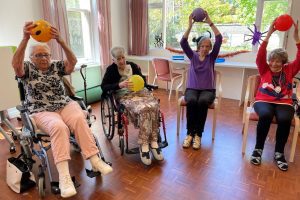Latest coronavirus advice for people over 70

As coronavirus spreads throughout the UK, the government has released recommended safety precautions for vulnerable people, including anyone over the age of 70.
Whether you are healthy or have a specific health condition, the government is asking for your support to slow down the spread of coronavirus and keep yourself safe. The underlying health conditions they are referring to include:
- Chronic respiratory diseases:
- Asthma
- Emphysema
- COPD (Chronic obstructive pulmonary disease)
- Bronchitis
- Chronic kidney disease
- Any chronic heart disease including heart failure
- Chronic liver disease like hepatitis
- Diabetes
- Chronic neurological conditions:
- Motor neurone disease
- Parkinson’s disease
- MS (Multiple sclerosis)
- Cerebral palsy
- Learning disability
- A weakened immune system stemming from:
- HIV and AIDs
- Medicines including steroid tablets
- Chemotherapy
- Spleen problems:
- Including if you have had your spleen removed
- Sickle cell disease
- Anyone with a BMI of 40 or above
There are additional clinical conditions that increase the risk of severe illness from coronavirus. Anyone that falls into this category will be contacted directly by someone from NHS England to advise on additional actions that should be taken to maintain safety.
Summary of the latest government advice for individuals over 70
- Wash hands more often.
- If a member of your family or someone living with you shows coronavirus symptoms, self-isolate for 14 days.
- If you live alone and show symptoms of coronavirus, self-isolate for seven days.
- Refrain from social mixing within the community.
- Stop friends and family coming into your home for the foreseeable future.
- Access essential services remotely wherever possible.
- Vary any daily commutes and utilise public transport less often.
- If working, it is strongly advised that you work from home if that is an option.
Social distancing
On 16th March, the government requested that everyone, especially those over 70, adopt social distancing. This request is made in the hope of reducing the speed in which coronavirus is being transmitted. Social distancing is expected to continue for the coming weeks, potentially longer, and includes:
- Avoiding contact with anyone who is experiencing coronavirus symptoms.
- Refraining from the use of public transport and travelling outside of rush hour only when you have to.
- Working from home wherever possible.
- Avoiding large gatherings or any gatherings that take place in small public areas including pubs, restaurants, cinemas and theatres etc.
- Where possible, refraining from family gatherings, making use of phone, internet and social media instead.
What this means for doctors appointments and medication
Where possible, try to access any services remotely. If you have a hospital appointment scheduled, call your GP to discuss the options available and ask whether it is safe to attend the appointment.
You should be able to request delivery of your medication either online or over the phone. Where this is not a possibility, it is recommended that a friend or family member collects these on your behalf and leaves them outside your door.
How to make self-isolation easier
Keeping away from loved ones and social groups, particularly for individuals who thrive in social situations, can be extremely frustrating. Although it is vital to stay as safe from coronavirus as possible, it is equally as important to maintain a healthy mental state. There are ways to make self-isolation more comfortable, these include:
Ensure there is a method to reduce loneliness and communicate with the outside world
This could be a phone call or text message through to face-timing via Whatsapp, Facebook, Skype etc. Discuss which would be the best option with your family and friends as you will all need to use the same tool to communicate.
While social media is a fantastic means of communication, it is important also to limit its use as it could easily cross the line from being a means of connection to negatively impacting your mental health.
Make an at-home exercise plan
If you are able, regular exercise will help maintain positive mental health as well as keep your body healthy. There are a variety of activities targeting a range of abilities that can be accessed online.
Fill your time
Self-isolation is a fantastic opportunity to:
- Catch up on reading
- Try out some new recipes (you can order ingredients online)
- Stream some new TV shows
- If your property has a garden, you can try your hand at gardening
- Declutter your home. Items that you no longer want can be packed and stored ready for removal after social distancing ends
Get external support
You can take an NHS quiz online that will give you a bespoke plan to help maintain your positive wellbeing. This aims to help you feel more secure and in control, particularly during these daunting times.
If a loved one usually offers help and support, it may be worth considering investing in homecare support to ensure all of your needs are met; particularly if your loved one has to self-isolate.
You can find out more about the support we offer across the country using the links below.
Or view all our locations here.




